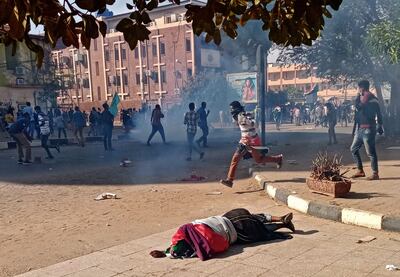Sudan's army deployed thousands of troops across the capital Khartoum on Saturday to contain a rally of tens of thousands of people protesting against military rule and demanding that generals relinquish power, witnesses said.
In a bid to prevent co-ordination between the protesters, the military used coils of barbed wire, concrete barriers and shipping containers to seal off Nile bridges connecting Khartoum's three districts. The internet and telephone lines were also cut, people in the city said.
"Attempts to block out the abuses of the coup regime against our revolutionary people will ricochet, bring down the coupists and see to their eternal departure from the Sudanese scene," a union of doctors linked to the pro-democracy movement said after internet access was curtailed.
"We will continue to carefully monitor those abuses regardless of what the regime does," said the union, which has been meticulously tallying and verifying casualties of the political violence in Sudan since 2018.
The Central Committee of Sudanese Doctors said 178 people were injured during Saturday's protest, with eight caused by live bullets.
In separate statements, the committee said security forces entered Khartoum Hospital and Port Sudan Hospital.
Activists said security forces overnight detained several prominent activists and members of the Resistance Committees, the main force behind the organisation of anti-military rallies.
The arrests, the killing of protesters - nearly 50 since the October 25 coup - and the disruption of internet and telephone services hearken back to the methods used by the regime of dictator Omar Al Bashir during four months of street protests against his 29-year rule in 2018 and 2019.
The protests led to the military removing Al Bashir in April 2019.
On Saturday, the military also closed off roads leading to the Republican Palace and the armed forces' headquarters, witnesses said.
They used tear gas to disperse thousands who tried to reach the Republican palace.
The protesters chanted, danced and sang to the beat of drums and waved Sudanese flags.
"The people are stronger and going back is impossible," they chanted. "The people want to bring down the regime."
Deployed alongside troops on Saturday were members of the Rapid Support Forces, which was initially formed in the 2000s to fight anti-government rebels in the western region of Darfur, where the militiamen are alleged to have committed atrocities against civilians.
The militia's leader, Gen Mohamed Dagalo, is now the most powerful man in Sudan after Gen Abdel Fattah Al Burhan, the army chief who led the October coup that derailed the country's democratic transition following Al Bashir's removal.
Saturday’s rallies increased pressure on the military to step aside two months to the day after Gen Al Burhan led his military takeover, dismissing the civilian-led government and declaring an indefinite state of emergency. But the military appears to stand steadfast in the face of the protests, more of which are planned for December 30.
Gen Al Burhan last month reinstated Abdalla Hamdok, the prime minister he dismissed when he seized power, but the move fuelled protests as activists and opposition politicians saw this as an attempt to camouflage direct military rule.
Mr Hamdok was branded a traitor by activists.
Saturday’s rallies happened six days after hundreds of thousands took to the streets in Khartoum and elsewhere in Sudan to demand a civilian government and for the military to quit politics.
Security forces used tear gas, stun grenades, rubber bullets and live rounds to disperse them.
At least two people were killed and about 300 were hurt on December 19. The two fatalities took to nearly 50 the number of protesters killed since the October 25 takeover.

There are allegations that at least eight female protesters were raped last Sunday by security forces.
The alleged rapes were strongly condemned by foreign powers, including the US and Britain, and led to calls for authorities to investigate.
There were similar allegations in June 2019 when security forces moved to break up a sit-in protest outside the military headquarters in Khartoum.
At least 100 protesters were killed then, with the bodies of some thrown into the Nile.
An investigation began shortly after the incident, with a six-month deadline to publish the findings.
Two years later, there has been no progress, amid speculation the military and its allied militia suspended the probe over concerns the findings could implicate the top brass.
Gen Al Burhan also said the killing of protesters since his October 25 takeover would be investigated, but has yet to give any details such as who will investigate or when the findings will be announced.
The US and the World Bank have suspended hundreds of millions of dollars' worth of aid to Sudan in response to the October 25 military takeover.










